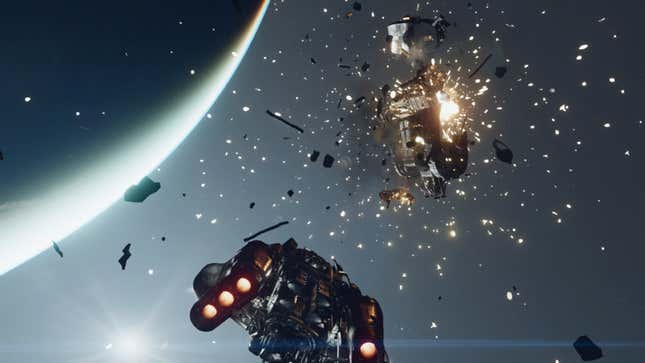
Every Friday, A.V. Club staffers kick off our weekly open thread for the discussion of gaming plans and recent gaming glories, but of course, the real action is down in the comments, where we invite you to answer our eternal question: What Are You Playing This Weekend?
In my initial Starfield write-up, one of the little issues I had with the game was that—in the early hours—the developers at Bethesda seemed oddly insistent on your character behaving a certain way. You can play how you want, whether you go in blasters blazin’ or you try smooth-talkin’ your way through the universe. But the early parts of the story seemingly require your character to be treated like a plucked-from-obscurity space-nobody who didn’t really exist until the opening scene that depicted your first day as a space-miner digging up space-rocks.
It’s not a huge deal, and it becomes a smaller and smaller deal with every subsequent hour you play. But because of that, I jumped headfirst into playing my character a certain way once it became a more viable option. In other words, I said goodbye to Vel, the green-haired former miner embarking on an awe-inspiring journey through the stars, and I reintroduced Vel, the green-haired space-dirtbag who’ll do anything as long as there’s space-money involved.
But my adventures as a space-dirtbag took a weird turn after a while: I found myself feeling bad about my craven disregard for morality, in a way that Starfield predecessors like Skyrim and Fallout 4 had never done before. The story of Starfield involves a mega-corp called Ryujin that, in this universe, is best known for making devices called neuroamps that plug into your face and give you better odds of scaring off attackers or whatever (role-playing game stuff).
Ryujin’s headquarters is in the cyberpunk city of Neon, and the company’s line of quests involves you stealing things from competitors, sabotaging competitors, and strong-arming basically everybody. It is, in short, pretty evil stuff, and the game makes a point to repeatedly give you options in conversations to object to just how evil it is. Your boss will say something like “break into this office and steal something, please don’t kill anyone because it will be a headache for our legal department, but you can if you want to,” and then your options will be, among other things, “Alright, cool” or “I’m not actually very comfortable with this.”
A space-dirtbag always says “cool,” as long as they’re getting paid, and I got hours into this Ryujin storyline before I ever spent one moment having second thoughts about what I was doing. Sneak into my own office so I can investigate my coworkers? Sure. Assassinate someone for questionable reasons on behalf of a corporate spy who is an even bigger dirtbag than me? Absolutely, it’s an honor. Undergo dangerous surgery to have unproven tech implanted in my brain that gives me mind control powers? Bring it on.
Wait: Actually, it’s that last one that made me hesitate. Not the unproven tech itself—I’ll never turn down a new superpower in a video game—but the way this storyline quietly turned that “upgrade” into a point of no return. As soon as you start messing around with the new power, Ryujin executives start drooling about selling it to the highest bidder, with mind control powers exclusively for the richest and most powerful, and that’s when I realized I had made a huge, Gob Bluth-style mistake.
These Bethesda games always have moral quandaries of some sort, but rarely do I actually feel bad about whatever I choose. I’ve nuked the town of Megaton in Fallout 3 and joined the Dark Brotherhood in Skyrim without batting an eye. But the reason this feels different is that the world of Starfield is subtly very different from anything this studio has done before. Skyrim and the other Elder Scrolls games are fantasy, where the rules of that world can be anything. Fallout is a parody of retro-futurism, where everything has a layer of irony.
But Starfield plays it all pretty straight. There are wacky things and lighthearted moments out in the universe, but thanks to the setting—this takes place a few centuries ahead of our current world—and the generally sterile aesthetic (the devs call it “NASA-punk”), the things happening in Starfield feel closer to the things happening in the real world than anything else in a Bethesda game, which means the moral questions feel a little more real. I might let an evil robot go nuts on Fallout’s wasteland because that seems fun, but put me in a recognizable version of our reality and ask me what I should do, for example, with a rogue A.I. that is gaining sentience, and I’ll pull the plug on that motherfucker, consequences be damned (I won’t spoil that quest, which is loosely tied to Ryujin, but … there were consequences).
This is all a fascinating side-effect of the world that Bethesda has built in this game, and a quiet indication of just how damn impressive it all is. It’s built on relatively straightforward bones—“Skyrim in space,” as I eloquently and handsomely put it in my previous piece—but there’s more here, something a little more nebulous, that feeds into the magic of this kind of mega-budget triple-A video game. It feels familiar, sure, but that makes the little moments that don’t (like this Ryujin quest line did for me) really sing.
The storyline ends, minor spoiler alert, with you attending a board meeting to decide the future of Ryujin: Put on a good face and let the public think you’re as magnanimous as any other mega-corp, or dance on the grave of your biggest competition and start selling mind control devices to government and law enforcement agencies. I resisted the evil option and suggested that the company do the right thing, and wouldn’t you know it, the board agreed with me ... after some ... nudging. What can I say, I’m a dirtbag.